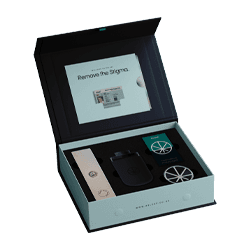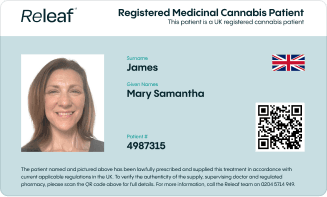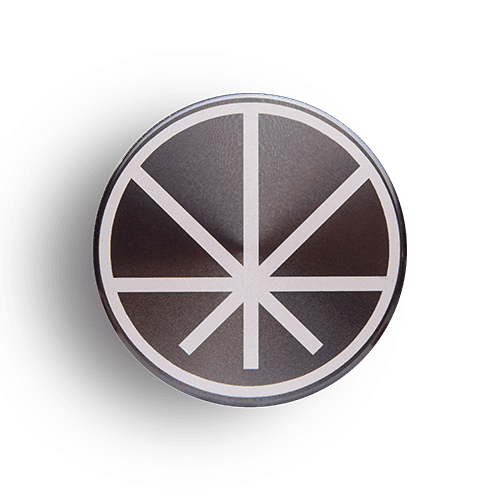CBD (cannabidiol) is a non-intoxicating phytocannabinoid produced by the cannabis sativa L. genus that has, in the past decade or so, garnered rising attention due to its potential therapeutic benefits. Recent research suggests it may enhance mood, reduce stress, provide mild pain relief, and have a hugely positive impact on both chronic and acute inflammation.
This therapeutically powerful non-intoxicating compound interacts with the body's endocannabinoid system (ECS), and also the adenosine, GABA, serotonin, and vanilloid receptors. CBD can be medically applied through inhalation, oral ingestion, sublingual administration, and topical application. When looking to add CBD into a treatment regime, it is crucial to maintain proper dosage and seek medical supervision for optimal health outcomes.
In this article, we uncover the key therapeutic applications of CBD, unravel the mechanisms behind its efficacy in simple terms, and examine the current scientific evidence that sheds light on its full capabilities. But first, a brief rundown of the history of CBD.
The history of CBD
CBD may seem like a modern-day medical marvel, but its application in medical settings dates as far back as 2900 BC in the ancient Chinese writings of Emperor Shen Nung (who is widely renowned as the pioneer of Chinese medicine). Egyptian doctors administered cannabis-based treatments for inflammation and glaucoma, while ancient Greeks took it for pain relief and malaria.
CBD was the first phytocannabinoid isolated from cannabis way back in 1940, but the actual structure wasn't entirely made clear until 23 years later. It was first synthesized in 1963 and shortly after, THC (tetrahydrocannabinol) was discovered to be the major psychoactive component of cannabis. Since then, research has been carried out to explore the medicinal properties of CBD as well as other non-intoxicating compounds of the cannabis plant.
With drug policies slowly changing worldwide, CBD continues to gain traction for its range of potentially beneficial properties. On November 1st 2018, new legislation was passed that made access to medicinal cannabis a reality in the UK. Since that time, we have seen a slow but steady up tick in medicinal cannabis products being prescribed.
CBD based products can be legally sold without the need for a prescription, but these must contain less than 1 mg of THC per container, or less than 0.2% THC.
What are the potential therapeutic benefits of CBD?
While CBD has been associated with numerous potential therapeutic benefits, its most notable and widely acknowledged application lies in the treatment of inflammation, and in reducing the seizures caused by specific childhood epilepsy syndromes. Examples of such syndromes include Dravet syndrome and Lennox-Gastaut syndrome, which commonly do not respond to conventional antiseizure pharmaceutical options.
The area of CBD research is still in its infancy, and much of the evidence is based on anecdotal reports and preclinical trials. However, emerging data from clinical studies have found that the compound may be helpful in treating a wide variety of medical conditions, including:
- Anxiety: Numerous studies and clinical trials are currently exploring the widely reported claim that CBD has the potential to reduce anxiety.
- Insomnia: Research suggests that CBD may be beneficial in helping people who had sleep issues to both fall asleep and maintain a restful sleep.
- Chronic and acute pain: Although additional human studies are required to fully validate the claims of CBD's pain-controlling effects, numerous studies indicate that CBD may help alleviate pain and inflammation associated with a range of pain related issues. Additionally, other research highlights CBD's potential to inhibit inflammatory and neuropathic pain, which are notoriously challenging to treat.
- Addiction: Promising research in humans suggests that CBD, under specific conditions, can help reduce cravings for tobacco and heroin. Animal models of addiction also indicate that CBD may have potential in reducing cravings for alcohol, cannabis, opiates, and stimulants, as it interacts with various receptors in the body.
- The reduction of side effects related to cancer treatment: Studies indicate that CBD may offer relief from the side effects of chemotherapy, such as nausea and vomiting. Animal models have also shown that it can help mitigate cognitive deterioration associated with radiation therapy.
- Neurological disorders: Research suggests that CBD has the potential to help with movement disorders that originate from the central nervous system, such as Parkinson’s disease, alongside other neurodegenerative diseases, such as multiple sclerosis.
Other potential therapeutic advantages of CBD include:
- Reduced symptoms of depression
- Improved heart health
- Enhanced skin vitality
- Boosted digestive health
- Supports bone growth
How does CBD work?
To understand exactly how CBD works inside the human body, we need to look at its interaction with the endocannabinoid system (ECS).
In short, the ECS is the largest neurotransmitter system in the body and is composed of endocannabinoids (cannabinoids naturally produced in the body), their receptors, and enzymes to create and then break down the endocannabinoids once the chemical signalling function has been completed.
The primary function of the ECS is to regulate homeostasis, with researchers now believing that it is the 'master regulator' of the human system. It plays a role in a wide range of physiological processes, including sleep, appetite, pain perception, inflammation, mood, and memory.
When CBD enters our body, through any method of administration, it has been shown to interact with both the CB1 and CB2 receptors in the ECS and other periphery receptors throughout the body via direct or indirect ways. We will explain all of this in more detail below.
Recent research suggests that CBD's interaction at the CB2 receptor site has shown potential in modulating and downregulating inflammation and immune response. These findings imply that CBD ingestion may have positive effects on autoimmune and proinflammatory conditions.
However, unlike the more commonly known cannabinoid THC – which binds directly to cannabinoid receptor CB1 to produce the psychoactive effects, CBD uses a more indirect method that modulates the receptor's activity. This is achieved by reducing the efficiency of the enzymes that are responsible for breaking down our own endocannabinoids, such as anandamide (also known as the bliss molecule).
The peripheral receptors CBD also interacts with are the serotonin, vanilloid, and GABA receptors.
CBD and the CB1 and CB2 receptors
Cannabidiol (CBD) interacts with CB1 and CB2 receptors of the endocannabinoid system.
CB1 receptors are predominantly found in the brain, while CB2 receptors are more concentrated in the immune system and various peripheral tissues. Although CBD has a low binding affinity for these receptors, a study published in the medical journal “Frontiers in Pharmacology” suggests that it can act as a non-competitive negative allosteric modulator of the CB1 receptor when present with THC, reducing the efficacy and potency of THC.
CBD has a stronger binding affinity with CB2 receptors, and in particular it is known to inhibit the metabolism of anandamide within the body. Anandamide is classified as an endocannabinoid and plays a role in pain regulation, memory, appetite, anxiety reduction, and controlling inflammation.
CBD and serotonin receptors
A 2019 publication in the leading medical journal Pain explains how CBD interacts with the (5-HT)1A serotonin receptor to provide pain relief and mood-enhancing effects.
Further research in the Neurochemical Research journal shows how CBD behaves as an agonist at this serotonin receptor. In simple terms, this means that CBD is able to activate this receptor more effectively than serotonin itself, potentially resulting in a reduction of pain and an improved mood.
CBD and vanilloid receptors
Vanilloid receptors are found throughout the body and respond to various stimuli, including heat, inflammation, and pain. A study, titled “Vanilloid TRPV1 receptor mediates the antihyperalgesic effect of the nonpsychoactive cannabinoid, cannabidiol, in a rat model of acute inflammation” demonstrated that CBD is able to interact with TRPV1 receptors, which are also known as vanilloid receptors.
It is believed that this interaction is responsible for producing some of the anti-inflammatory effects observed with CBD administration. Additionally, it may be beneficial in controlling neuropathy and reducing pain that often comes as a result of nerve injury or damage.
CBD and GABA receptors
Gamma aminobutyric acid (GABA) is an amino acid produced naturally within the brain and responsible for helping maintain nerve cell excitability. It has been suggested that CBD may interact with GABA receptors to produce antianxiety effects.
This randomized controlled trial, published in 2019, found that CBD was able to reduce the anxiety levels of participants, and this effect may be mediated by GABA receptors.
CBD and adenosine receptors
Adenosine receptors are found to regulate sleep and wake cycles, as well as modulate inflammatory processes, as well as regulate blood flow and pain. The interaction of CBD with adenosine receptors has been demonstrated to decrease inflammation and reduce anxiety in animal models.
This study, published in the scientific journal “Molecules”, explains how CBD affects the central nervous and cardiovascular systems by mediating various effects and producing desirable results. It also suggests that the interaction between CBD and adenosine receptors may be beneficial in treating various neurological and cardiovascular disorders, and reducing chronic inflammation.
What different CBD products and administration options are available?
CBD can be taken in numerous ways, depending on the desired effect, your own personal preference, and the advice of the prescribing doctor.
Common methods of CBD administration include:
- Dried CBD flower for vaporisation
- CBD oil or tincture administered sublingually
- CBD capsules or pills
- CBD edibles (gummies, chocolates, and other candies)
- CBD oil for vaporisation
- CBD topicals (creams, lotions, balms, & salves) for transdermal application
- CBD patches
There are a range of pros and cons relating to each of the above administration methods, so it is important to consider your own individual objectives and needs before deciding on which method to use.
CBD Inhalation
Inhaled medical cannabis offers the fastest onset of effects, and does so with the highest bioavailability. While inhalation of CBD is often related to smoking, the rise of vaporising has allowed users to access the same fast-acting effects without any of the potential harm posed by smoking.
Smoking dried cannabis flower is an option, but at Releaf, we do not promote smoking as a viable medical option due to potential health risks associated with the inhalation of smoke. Using a vaporiser to consume dried medical cannabis flower is encouraged as a healthier and more efficient alternative.
CBD sublingual administration
CBD tinctures and oils can be taken sublingually, which means they are held under the tongue for 30 to 90 seconds to allow the product to be absorbed directly into the bloodstream. This method is a fast and efficient way to feel the effects, as it bypasses the digestive system, allowing for faster absorption.
Additionally, sublingual application is discreet and offers an easy way to accurately take a pre-measured dose.
CBD edibles
CBD edibles are very popular, as they allow patients to enjoy the therapeutic effects of CBD in a discreet and convenient way. Edibles are usually made using an oil or distillate, which is then combined with other ingredients to create tasty treats such as gummies, chocolates, and other candies.
But, edibles offer the lowest bioavailability (meaning less of the CBD makes it into your bloodstream) and take a while to kick in - between 30 to 90 minutes - so they are not the best option if you need fast-acting effects. This is due to the first-pass effect, where the CBD must be digested and metabolised before it enters the bloodstream.
CBD topicals
Topical CBD products can come in the form of creams, lotions, salves, and balms, which are applied directly to the skin. Topicals offer a range of potential benefits, including:
- Relief from muscle and joint pain
- Reducing inflammation and swelling
- Addressing certain skin conditions such as eczema and psoriasis
CBD dosage recommendations
When it comes to the medical application of any cannabis-based therapeutic option, including CBD, you should always seek the guidance and advice of a healthcare professional. Although a wide range of CBD products are legal for 'over-the-counter' sale and can be found in a variety of shops, there are two main reasons why you should consider going down the prescription route.
First up, consumer CBD products are not subject to the same rigorous regulatory processes as medicinal cannabis products. While the rules have changed in the past two years regarding the claims that consumer CBD products can make, these products do not have as much oversight in regard to their efficacy and safety.
Secondly, there are many factors that go into finding the correct dose, making the process complex to say the least. It depends on factors such as the patient's age, weight, overall health, and medical condition. Additionally, different administration methods can result in different responses. A healthcare professional is best placed to understand these factors and can help you find the right dose for your specific needs. Here in the UK, only specialist doctors can prescribe medical cannabis, so it's important to find a doctor who is knowledgeable and able to provide the best advice for your specific and unique circumstances.
With that said, should you choose to take CBD as an over-the-counter supplement, it is essential to start with a low dose and slowly increase the amount until the desired effects are achieved. A good starting point is around the 5 – 10 mg mark, which can then be increased by 5 mg per day until the desired effects are achieved.
Does CBD come with any side effects?
CBD is considered to be extremely safe and well tolerated, even at very high doses. However, like any other medication or supplement, it can come with certain side effects that you should be aware of.
Side effects may include drowsiness, dry mouth, lightheadedness, low blood pressure and nausea. Oral CBD products may cause some gastrointestinal discomfort, but this tends to be more common if the product is not taken with food.
Because CBD affects everyone differently, it's important to track your response when taking it to ensure that you are not experiencing any negative side effects. The majority of people do not experience any serious side effects, but it's better to be aware and prepared in case something unexpected does occur.
Does CBD interact with other drugs?
CBD has the potential to interact with other drugs that are metabolized by the same pathways when taken in unison. The majority of these interactions occur when the drug compounds are processed by liver enzymes, specifically CYP3A4 and CYP2C19, which both play a major role in drug metabolism.
This only further bolsters the need to communicate with a healthcare professional when considering CBD as a therapeutic therapy option. By discussing the drugs you're already taking, they can assess any potential drug interactions and advise on whether CBD is safe to take.
Final thoughts
CBD (and medical cannabis in general) is finally getting the recognition it deserves and offering patients suffering from a range of medical conditions a viable complementary treatment option. Although you may have seen CBD being touted as some sort of miracle cure-all, it is important to remember that it is best applied as part of a holistic treatment plan and offers potential symptomatic relief.
When considering CBD as a treatment option for any medical condition, the best advice is to consult with a healthcare professional first. They are the best placed to understand your needs and provide the best advice for your unique situation.
Releaf understands that finding a doctor who is knowledgeable and registered to prescribe medical cannabis can be difficult. That's why we offer online consultations with our specialist doctors, as well as a unique medical cannabis card for extra protection and access to the treatment you require. If you're interested in learning more about our services or getting access to medical cannabis treatment, get in touch and one of our team members will be happy to help.





